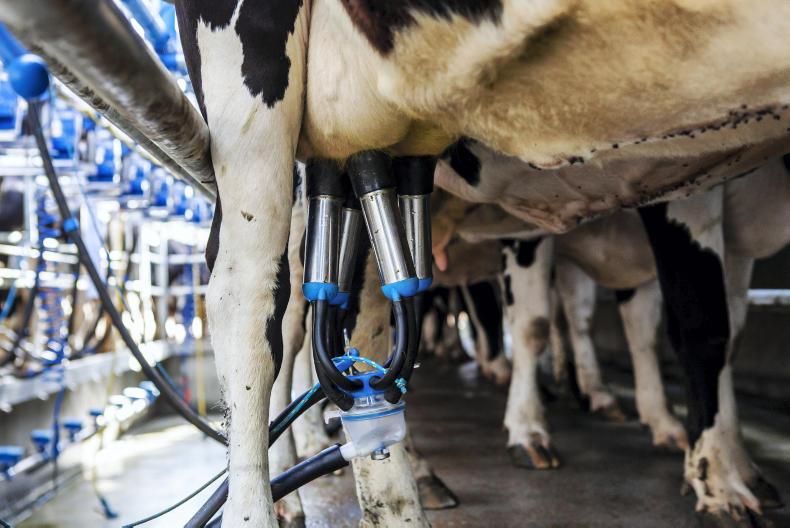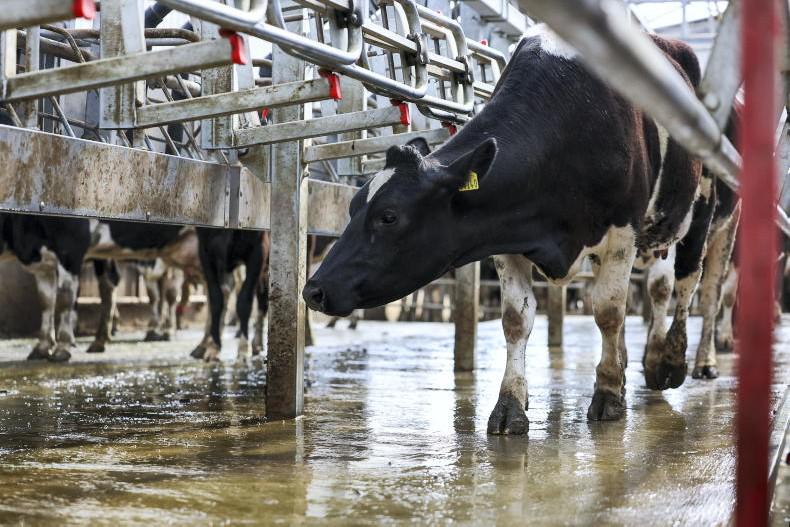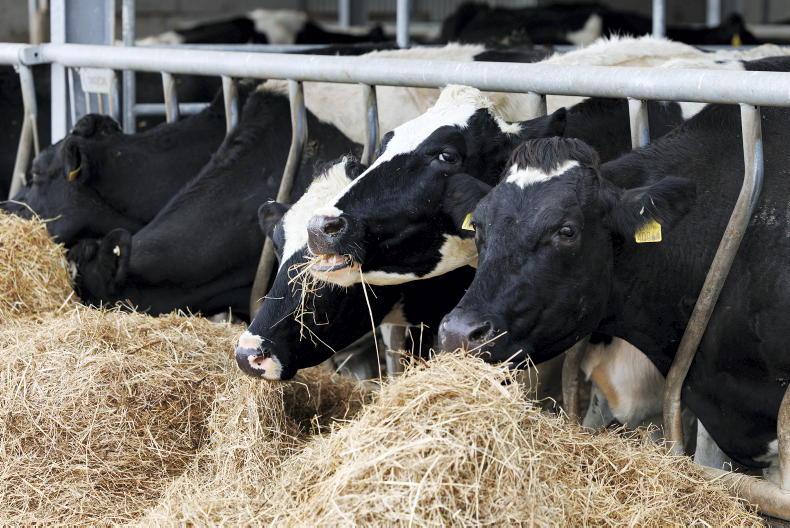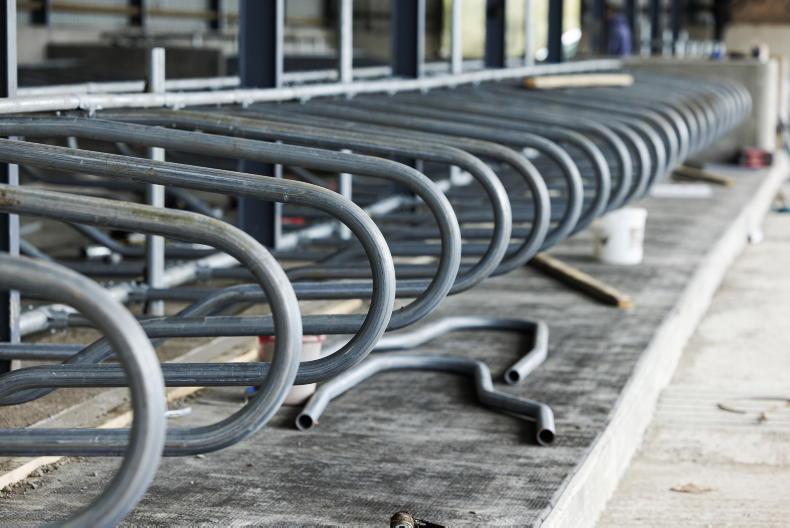Over 75% of dairy farmers surveyed by the Irish Farmers Journal at the Winter Fair said that they would like to see changes in how milk is priced in NI.
The current pricing system pays on a retrospective basis, with the base price set for the previous month’s production.
However, farmers would like a similar pricing system to that in Britain, where producers know base prices at least one month in advance, ie the January milk price would be set in December.
A further 26% said they would like to know base price at least two months in advance.
Knowing the milk price in advance allows farmers to target productive cows with cost-effective feeding programmes.
Fixed prices
But, in return, a number of milk processors can point to the fixed price milk schemes they have introduced as a means of giving farmers more certainty, and to reduce the level of price volatility.
Fixed price schemes guarantee suppliers a set base price over a 12- to 36-month period. They can work in a farmer’s favour when conventional milk prices are falling, as was the case across 2019. But they can equally work against farmers when markets are rising quickly.
However, banks and lending institutions like these fixed price incentives, as they reduce lending risks. There are also benefits for the processor, as the scheme helps safeguard milk pools.
In most cases, however, the fixed price scheme is underpinned by a contract with a retail or wholesale customer, who has effectively locked in business with a processor at a guaranteed price or margin. The main challenge can be to find customers who are willing to do that.
Dale Farm
Dale Farm has two contracts in operation with approximately one third of its suppliers committed under both agreements.
Scheme one runs from 1 January 2018 to 31 December 2020, guaranteeing suppliers a base of 27p/l, before normal premiums on milk quality and volume are applied.
Excluded under the contract is the 2p/l winter bonus, as is the 0.3p/l loyalty bonus. Suppliers committed between 10% and 60% of milk produced during the lowest production month of the year.
The second fixed price guaranteed a base of 28p/l over a three-year period starting on 1 January 2019.
Under this contract, suppliers committed 5%, 10% or 15% of their milk pool.
Aurivo
Aurivo launched its fourth scheme on 1 October 2019, with 40% of suppliers signed up under the 12-month contract.
It guarantees suppliers a base of 27p/l on 10% of annual production. Excluded is the winter bonus payments of 2p/l.
Aurivo also has a fixed price scheme with a base of 29p/l payable on 10% of annual supply until 31 December 2020.
Lakeland
Lakeland’s fixed-price contract pays 26p/l from April to September and 28p/l from October to March on a maximum of 10% of annual supply and runs to December 2020.
Glanbia Milk also has fixed price schemes which pay a base of 28p/l.
Cost benefit
So is there an income benefit to participating in a fixed price milk scheme?
In the table we use a hypothetical example of a dairy farmer who committed 50% of their annual milk supply under a fixed price contract set at 27.5p/l.
The farmer supplies Dale Farm, producing 650,000l per annum. Milk quality is taken from the monthly NI milk leagues published on these pages from December 2018 to January 2019.
Typical transport costs have also been factored, based on alternate-day collection, with loyalty and winter bonus payments excluded.
The 50% of milk not under contract, is paid at the normal monthly base price, plus top-up premiums on milk quality, volume and winter bonuses.
Higher price
Based on the example, the fixed price scheme paid a higher milk price in 11 of the last 12 months.
Across the 12-month period, the fixed price scheme paid an average of 28.4p/l, compared with 26.8p/l under conventional pricing.
As a standalone milk price, the 28.4p/l under the fixed price option would put it 1.26p/l ahead of the table topping price paid by Lakeland (Table A) during the same 12-month period.
Applying this fixed milk price to 50% of the milk brought an additional £4,920 in milk sales during 2019 for this 650,000l producer.
Of course, the price could easily go the opposite way. For instance, from December 2017 to November 2018, the conventional 12-month rolling milk price paid by Dale Farm was 29.27p/l, meaning milk sold under a fixed price scheme was at a disadvantage.
But perhaps the key issue is the lower range in price received across the year. In the example, where the farmer had 50% of milk in a fixed price scheme, the lowest price received was 26.3 and the highest price was 29.02 (a range of 2.7p/l). However, outside of a fixed scheme, the lowest monthly price was 25.2p/l and the highest was 29.3 (a range of 4.1p/l).
Read more
Aurivo offers new fixed milk price contract
Dale Farm announces 28p/l fixed price scheme
Over 75% of dairy farmers surveyed by the Irish Farmers Journal at the Winter Fair said that they would like to see changes in how milk is priced in NI.
The current pricing system pays on a retrospective basis, with the base price set for the previous month’s production.
However, farmers would like a similar pricing system to that in Britain, where producers know base prices at least one month in advance, ie the January milk price would be set in December.
A further 26% said they would like to know base price at least two months in advance.
Knowing the milk price in advance allows farmers to target productive cows with cost-effective feeding programmes.
Fixed prices
But, in return, a number of milk processors can point to the fixed price milk schemes they have introduced as a means of giving farmers more certainty, and to reduce the level of price volatility.
Fixed price schemes guarantee suppliers a set base price over a 12- to 36-month period. They can work in a farmer’s favour when conventional milk prices are falling, as was the case across 2019. But they can equally work against farmers when markets are rising quickly.
However, banks and lending institutions like these fixed price incentives, as they reduce lending risks. There are also benefits for the processor, as the scheme helps safeguard milk pools.
In most cases, however, the fixed price scheme is underpinned by a contract with a retail or wholesale customer, who has effectively locked in business with a processor at a guaranteed price or margin. The main challenge can be to find customers who are willing to do that.
Dale Farm
Dale Farm has two contracts in operation with approximately one third of its suppliers committed under both agreements.
Scheme one runs from 1 January 2018 to 31 December 2020, guaranteeing suppliers a base of 27p/l, before normal premiums on milk quality and volume are applied.
Excluded under the contract is the 2p/l winter bonus, as is the 0.3p/l loyalty bonus. Suppliers committed between 10% and 60% of milk produced during the lowest production month of the year.
The second fixed price guaranteed a base of 28p/l over a three-year period starting on 1 January 2019.
Under this contract, suppliers committed 5%, 10% or 15% of their milk pool.
Aurivo
Aurivo launched its fourth scheme on 1 October 2019, with 40% of suppliers signed up under the 12-month contract.
It guarantees suppliers a base of 27p/l on 10% of annual production. Excluded is the winter bonus payments of 2p/l.
Aurivo also has a fixed price scheme with a base of 29p/l payable on 10% of annual supply until 31 December 2020.
Lakeland
Lakeland’s fixed-price contract pays 26p/l from April to September and 28p/l from October to March on a maximum of 10% of annual supply and runs to December 2020.
Glanbia Milk also has fixed price schemes which pay a base of 28p/l.
Cost benefit
So is there an income benefit to participating in a fixed price milk scheme?
In the table we use a hypothetical example of a dairy farmer who committed 50% of their annual milk supply under a fixed price contract set at 27.5p/l.
The farmer supplies Dale Farm, producing 650,000l per annum. Milk quality is taken from the monthly NI milk leagues published on these pages from December 2018 to January 2019.
Typical transport costs have also been factored, based on alternate-day collection, with loyalty and winter bonus payments excluded.
The 50% of milk not under contract, is paid at the normal monthly base price, plus top-up premiums on milk quality, volume and winter bonuses.
Higher price
Based on the example, the fixed price scheme paid a higher milk price in 11 of the last 12 months.
Across the 12-month period, the fixed price scheme paid an average of 28.4p/l, compared with 26.8p/l under conventional pricing.
As a standalone milk price, the 28.4p/l under the fixed price option would put it 1.26p/l ahead of the table topping price paid by Lakeland (Table A) during the same 12-month period.
Applying this fixed milk price to 50% of the milk brought an additional £4,920 in milk sales during 2019 for this 650,000l producer.
Of course, the price could easily go the opposite way. For instance, from December 2017 to November 2018, the conventional 12-month rolling milk price paid by Dale Farm was 29.27p/l, meaning milk sold under a fixed price scheme was at a disadvantage.
But perhaps the key issue is the lower range in price received across the year. In the example, where the farmer had 50% of milk in a fixed price scheme, the lowest price received was 26.3 and the highest price was 29.02 (a range of 2.7p/l). However, outside of a fixed scheme, the lowest monthly price was 25.2p/l and the highest was 29.3 (a range of 4.1p/l).
Read more
Aurivo offers new fixed milk price contract
Dale Farm announces 28p/l fixed price scheme










SHARING OPTIONS